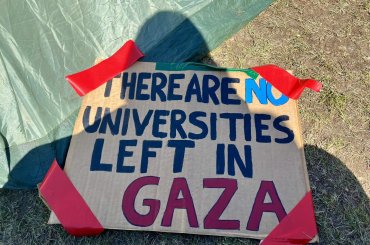Here’s one sign of how repressive the regime was in the Maldives, the island nation southwest of India. In 2013, I sat in a restaurant with youth leader Shauna Aminath as a thug tried to frighten her. We were in the Seagull Café in Malé, the crowded capital, and she was telling me about the inspiring pro-democracy movement when a man in his 40s passed by our table and shot her a hard look. She winced. “He wants me to know he’s with the police and that he’s following me,” she said. “They keep trying to intimidate us.” A few weeks earlier, she had been jailed once again, “just after my 28th birthday.”
Until last Sunday, September 23, the anti-democratic crackdown got worse. The tyrannical leader, Abdulla Yameen, arrested or exiled two previous presidents, jailed members of the Supreme Court, pandered to murderous Islamic extremists in the Muslim nation, and cracked down on the press — before calling an election that everyone was so certain would be rigged that outside observers stayed away. The opposition united behind a single candidate, Ibrahim Mohamed Solih, but had little hope of fairness. To everyone’s astonishment, Solih won a smashing victory despite the vote fixing, by such an overwhelming margin that Yameen has been forced to concede. A news photograph on election day showed a smiling Shauna Aminath, standing in line with other Maldivians waiting to vote.
The good news in Maldives came after six years of repression — and after an appalling failure of U.S. policy under the Obama administration. The crisis started in February 2012, when a charismatic young environmentalist president named Mohamed Nasheed was overthrown violently. Nasheed, whose courageous story is told in the impressive documentary film, The Island President, was precisely the kind of dynamic, progressive Muslim leader the U.S. should have enthusiastically supported, but although European nations protested the anti-democratic coup the Obama State Department said little — and stayed silent even when the coup regime rigged new elections the following year. Then, in February 2016, Yameen jailed Mohamed Nasheed for 13 years for “terrorism” until pressure from Europe allowed him to go into exile. Still there was little protest from Washington.
Shauna Aminath had studied in the U.S. for six years, in Missouri. She told me, “In 2008, I went door-to-door canvassing for Barack Obama. So I am completely disappointed that his government did not speak out against the violent overthrow of our elected president here in the Maldives.”
It was only over the last year or so that a new U.S. ambassador, Atul Keshap, did criticize the increasing repression. Here’s what he tweeted this past February, “On-going State of Emergency, curfews, riot police, former presidents in jail or exile, Supreme Court justices in jail, elected Members of Parliament in jail. . . I mourn Democracy in Maldives.” If Keshap had spoken out like that in 2012 the island nation might have been spared the long dark years of repression. Donald Trump himself probably can’t find the Maldives on a map, but it is a painfully ironic puzzle that his government’s policy is an improvement on his more progressive predecessor’s.
U.S. silence in no way served the interests of America. Quite the contrary: President Yameen relied for much of his limited support on a vicious local jihadist movement, which murdered Maldivian journalists and sent several hundred volunteers to fight in the Middle East with ISIS, the highest per capita recruitment rate in the world.
The New York Times ran a fairly long report about last Sunday’s election— which made no mention of how the U.S. whitewashed the Maldives’ turn toward repression. The Washington Post article was somewhat better, but it also said nothing about the American policy failure.
The new president, Solih, has pledged to release political prisoners, let exiles return, and end press restrictions. But the old regime, and its wealthy supporters among the “tourism tycoons” who own the resorts that attracted 1.5 million mostly European holiday-goers in 2016, will not give up power easily. If they strike back, what will the United States do?
P.S. After the September 23 election, Samantha Power, the high-ranking Obama official, tweeted out her congratulations to the Maldivian people, I politely reminded her that she had forgotten to add that her administration was partly responsible for the years of fear.



One can’t keep from wondering what the point of a propaganda arrticle apparently so totally disconnected from the problems of Zionist invasion may be.
Even if the pretext were a vague connection around the US administration/Zionist imperial intervention in the Indian Ocean, then it would seem to excuse rather than expose the murderous American hand, with imperial excuses such as:
“Failure” and “betrayal” my @-$$. Imperial invasion and oppression is the very lifeblood and raison d’être of US administrations and their Demolicanorepucrat party; you guys better try to camouflage a little bit your support for it. At least liminally enough to avoid being spotted by a babe in arms, or becoming another apple of discord among Palestine liberation supporters of various political tendencies.
I wouldn’t bother calling Obama more progressive than Trump. He was not in the least progressive. Let’s not suggest that he was. To get an idea how ‘progressive’, and ‘honest’, Obama was/is, give “Hopeless: Barack Obama and the Politics of Illusion,” edited by Jeffrey St. Clair and Joshua Frank a read. Every promise made by the stumping former President, except, arguably, one, was broken by him. The guy was a monster.
This is an important report. Thank you Mondoweiss and Shauna Aminath.